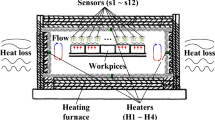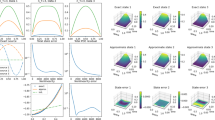Abstract
In the paper, we propose a novel approach to identify distributed parameter system (DPS) with recurrent state trajectory. Different from existing literature, the system dynamics rather than parameters or structure of DPS is identified in the study. Due to the infinite-dimensional feature of DPS, the partial differential equation describing the DPS is first approximated by a set of ordinary differential equations. By employing finite difference method, the spatial derivatives at a set of spatial points are approximated. Then, the DPS dynamics at the set of spatial points is identified via deterministic learning. With the identification results, a mechanism based on interpolation method is proposed to approximate the DPS dynamics at any other spatial point. That is, we can accurately identify the DPS dynamics at any spatial point. Numerical results involving the identification of an important mathematical physics equation are presented to illustrate the validity of the approach.












Similar content being viewed by others
References
Ucinski, D.: Optimal Measurement Methods for Distributed Parameter System Identification. CRC Press, Boca Raton (2004)
Schlacher, K., Schöberl, M.: Modelling, analysis and control of distributed parameter systems. Math. Comput. Model. Dyn. Syst. 17(1), 1–2 (2011)
Gonzalez-Garcia, R., Rico-Martinez, R., Wolf, W., Lubke, M., Eiswirth, M., Anderson, J.S., Kevrekidis, I.G.: Characterization of a two-parameter mixed-mode electrochemical behavior regime using neural networks. Phys. D Nonlinear Phenom. 151(1), 27–43 (2001)
Krischer, K., Rico-Martinez, R., Kevrekidis, I., Rotermund, H., Ertl, G., Hudson, J.: Model identification of a spatiotemporally varying catalytic reaction. AIChE J. 39(1), 89–98 (1993)
Li, H.X., Qi, C.: Modeling of distributed parameter systems for applications synthesized review from time–space separation. J Process Control 20(8), 891–901 (2010)
Coca, D., Billings, S.A.: Direct parameter identification of distributed parameter systems. Int. J. Syst. Sci. 31(1), 11–17 (2000)
Banks, H.T., Kunisch, K.: Estimation Techniques for Distributed Parameter Systems. Springer, Berlin (2012)
Guo, L., Billings, S.A., Coca, D.: Identification of partial differential equation models for a class of multiscale spatio-temporal dynamical systems. Int. J. Control 83(1), 40–48 (2010)
Cheng, J., Nakagawa, J., Yamamoto, M., Yamazaki, T.: Uniqueness in an inverse problem for a one-dimensional fractional diffusion equation. Inverse probl. 25(11), 115002 (2009)
Garvie, M.R., Trenchea, C.: Identification of space-time distributed parameters in the Gierer–Meinhardt reaction–diffusion system. SIAM J. Appl. Math. 74(1), 147–166 (2014)
Wang, Q., Feng, D., Cheng, D.: Parameter identification for a class of abstract nonlinear parabolic distributed parameter systems. Comput. Math. Appl. 48(12), 1847–1861 (2004)
Fang, H., Wang, J., Feng, E., Li, Z.: Parameter identification and application of a distributed parameter coupled system with a movable inner boundary. Comput. Math. Appl. 62(11), 4015–4020 (2011)
Li, L., Liu, W., Han, B.: Dynamical level set method for parameter identification of nonlinear parabolic distributed parameter systems. Commun. Nonlinear Sci. Numer. Simul. 17(7), 2752–2765 (2012)
Li, H.X., Qi, C.: Spatio-Temporal Modeling of Nonlinear Distributed Parameter Systems: A Time/space Separation Based Approach, vol. 50. Springer, Berlin (2011)
Gonzalez-Garcia, R., Rico-Martinez, R., Kevrekidis, I.: Identification of distributed parameter systems: a neural net based approach. Comput. Chem. Eng. 22, S965–S968 (1998)
Guo, L., Billings, S.A.: Identification of partial differential equation models for continuous spatio-temporal dynamical systems. IEEE Trans. Circuits Syst. II Express Br. 53(8), 657–661 (2006)
Li, H.X., Qi, C., Yu, Y.: A spatio-temporal volterra modeling approach for a class of distributed industrial processes. J. Process Control 19(7), 1126–1142 (2009)
Rannacher, R., Vexler, B.: A priori error estimates for the finite element discretization of elliptic parameter identification problems with pointwise measurements. SIAM J. Control Optim. 44(5), 1844–1863 (2005)
Wouwer, A.V., Renotte, C., Queinnec, I., Bogaerts, P.: Transient analysis of a wastewater treatment biofilter–distributed parameter modelling and state estimation. Math. Comput. Modell. Dyn. Syst. 12(5), 423–440 (2006)
Orlov, Y., Bentsman, J.: Adaptive distributed parameter systems identification with enforceable identifiability conditions and reduced-order spatial differentiation. IEEE Trans. Autom. Control 45(2), 203–216 (2000)
Chen, W., Wen, C., Hua, S., Sun, C.: Distributed cooperative adaptive identification and control for a group of continuous-time systems with a cooperative pe condition via consensus. IEEE Trans. Autom. Control 59(1), 91–106 (2014)
Chang, J.: Identification of variable coefficients for vibrating systems by boundary control and observation. J. Control Theory Appl. 6(2), 127–132 (2008)
Hong, K.S., Bentsman, J.: Direct adaptive control of parabolic systems: algorithm synthesis and convergence and stability analysis. IEEE Trans. Autom. Control 39(10), 2018–2033 (1994)
Demetriou, M., Rosen, I.: On the persistence of excitation in the adaptive estimation of distributed parameter systems. IEEE Trans. Autom. Control 39(5), 1117–1123 (1994)
Wang, C., Hill, D.J.: Learning from neural control. IEEE Trans. Neural Netw. 17(1), 130–146 (2006)
Wang, C., Hill, D.J.: Deterministic learning and rapid dynamical pattern recognition. IEEE Trans. Neural Netw. 18(3), 617–630 (2007)
Wang, C., Hill, D.J.: Deterministic Learning Theory for Identification, Recognition, and Control. CRC Press, Boca Raton (2009)
Shil’nikov, L.P.: Methods of Qualitative Theory in Nonlinear Dynamics, Part I, vol. 5. World Scientific, Singapore (2001)
Kuznetsov, Y.A.: Elements of Applied Bifurcation Theory, vol. 112. Springer, Berlin (2013)
Ralston, A., Rabinowitz, P.: A First Course in Numerical Analysis. Courier Corporation, Chelmsford (2012)
Lam, N.S.N.: Spatial interpolation methods: a review. Am. Cartogr. 10(2), 129–150 (1983)
Caruso, C., Quarta, F.: Interpolation methods comparison. Comput. Math. Appl. 35(12), 109–126 (1998)
LeVeque, R.J.: Finite Difference Methods for Ordinary and Partial Differential Equations: Steady-State and Time-Dependent Problems. SIAM, Philadelphia (2007)
Quarteroni, A., Sacco, R., Saleri, F.: Numerical Mathematics, vol. 37. Springer, Berlin (2010)
Zhou, G., Wang, C.: Deterministic learning from control of nonlinear systems with disturbances. Prog. Nat. Sci. 19(8), 1011–1019 (2009)
Hohmann, A., Deuflhard, P.: Numerical Analysis in Modern Scientific Computing: An Introduction, vol. 43. Springer, Berlin (2012)
Author information
Authors and Affiliations
Corresponding author
Ethics declarations
Conflicts of interest
The authors declare that they have no conflict of interest.
Additional information
This work was supported in part by the PhD Start-up Fund of Natural Science Foundation of Guangdong Province, China (Nos.: 2017A030310493, 2018A030310367), in part by the Fundamental Research Funds for the Central Universities (No.: 2018A030310367), in part by the National Major Scientific Instruments Development Project (No.: 61527811), in part by the Science and Technology Program of Guangzhou, China (No.: 201704020078).
Rights and permissions
About this article
Cite this article
Dong, X., Wang, C., Yang, Q. et al. System identification of distributed parameter system with recurrent trajectory via deterministic learning and interpolation. Nonlinear Dyn 95, 73–86 (2019). https://doi.org/10.1007/s11071-018-4551-0
Received:
Accepted:
Published:
Issue Date:
DOI: https://doi.org/10.1007/s11071-018-4551-0




